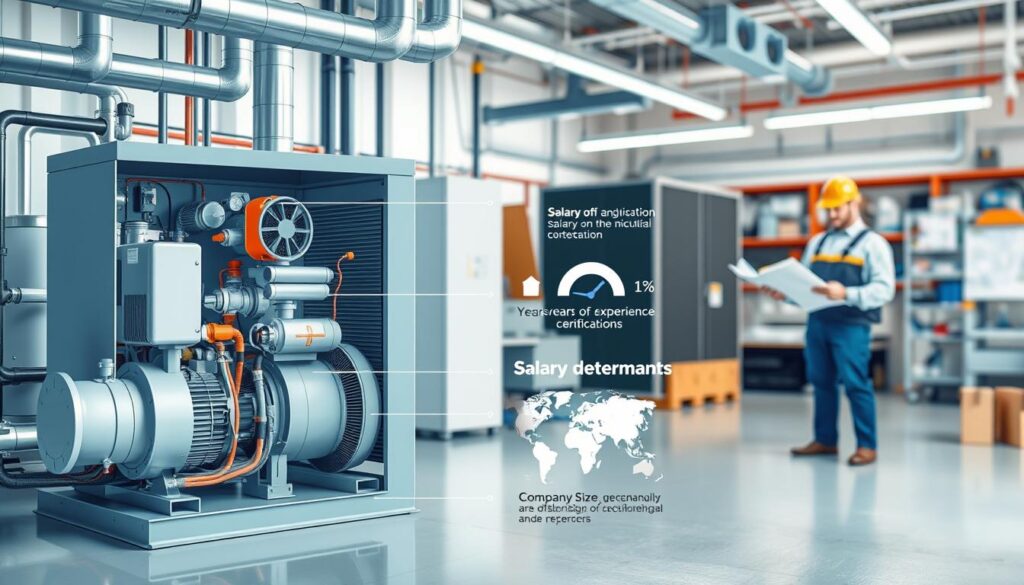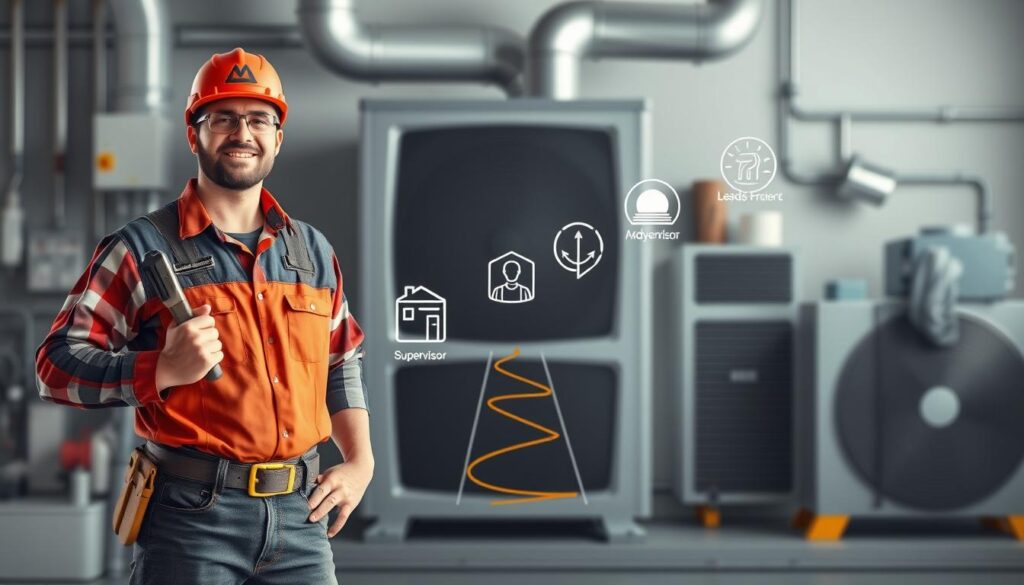Affiliate Disclosure
HVAC Guide Guys is a participant in the Amazon Services LLC Associates Program, an affiliate advertising program designed to provide a means for sites to earn advertising fees by advertising and linking to Amazon.
How Much Does A Journeyman HVAC Technician Make? Ever wondered how much HVAC technicians earn? They’re the ones who keep our places comfy. HVAC isn’t just about temperature—it’s a career that can pay well.

The US Bureau of Labor Statistics shares some interesting facts. HVAC technicians can make between $36,000 and over $80,000 a year. The average is about $54,000.
How much you earn depends on your experience, where you work, and your skills. If you’re thinking about this career or want to know your worth, knowing about HVAC salaries is key.
Key Takeaways
- Average HVAC technician salary ranges from $36,000 to $80,000
- Median annual income is approximately $54,000
- Earnings vary significantly by region and experience
- Specialized skills can boost your income
- This career offers stable and competitive pay
Table of Contents
Understanding the HVAC Journeyman Career Path
Starting a successful HVAC career needs careful planning and professional growth. Becoming a journeyman HVAC technician involves several steps. These steps shape your career earnings and future income.
Aspiring HVAC professionals must follow a structured path. This path includes education, practical training, and professional certification. Your career path will be shaped by key factors that affect your success in this field.
Educational Requirements and Licensing
To start in the HVAC trade, you must meet certain educational milestones:
- High school diploma or equivalent
- Technical school or community college HVAC program
- State-approved apprenticeship program
- Professional certification examinations
Experience Needed for Journeyman Status
To become a journeyman, you need a lot of hands-on experience. Most states require:
- 2-5 years of supervised work experience
- Minimum of 2,000 documented work hours annually
- Successful completion of technical training courses
- Passing of licensing examinations
Industry Standards and Expectations
Professional HVAC technicians must keep their skills up to date. Your trade income depends on staying current with new technologies. You also need to maintain certifications and show technical expertise in both residential and commercial systems.
Continuous learning is the cornerstone of a successful HVAC career.
Successful journeyman HVAC technicians have technical knowledge, practical skills, and adaptability. These qualities help them maximize their career earnings.
Explore Our HVAC Shop
Looking for top-rated HVAC tools, parts, and accessories? Visit our shop and find the perfect solution for your needs.
Visit the ShopNational Average Salary for HVAC Journeymen
Understanding the hvac wage scale is key for those thinking about an HVAC career. The HVAC technician salary landscape in the U.S. is promising.
The HVAC job market offers great earning chances. Your salary can change a lot based on your experience, location, and area of focus.
Base Salary Statistics
HVAC journeymen get good pay across the country. Here’s what you can expect:
- Median annual salary: $77,200
- Hourly wage: $37.12
- Entry-level technicians: $54,100 annually
- Entry-level hourly rate: $26.01
Regional Variations in Pay
Your salary can vary a lot based on where you work. Here are some regional insights:
- Northeastern states often pay more
- Urban areas have better salaries
- States with harsh climates need more HVAC skills
Experience-Based Salary Ranges
Your career growth affects your pay. As you gain more experience, your salary will go up:
- 0-2 years: Entry-level rates
- 3-5 years: A moderate pay increase
- 6-10 years: A big pay jump
- 10+ years: The highest pay
“Your skills and experience are your most valuable assets in the HVAC industry.” – Professional HVAC Association
Continuing to learn and specialize can really boost your salary and career.
How Much Does A Journeyman HVAC Technician Make in Different States
Your hvac journeyman pay rate can change a lot based on the state you work in. Knowing these differences helps you make better career choices. It also helps you earn more as an hvac professional.
Some states pay HVAC technicians a lot more. Let’s look at the highest paying areas:
- California: Leads with an impressive average salary of $59,200
- New Jersey: Offers competitive wages around $58,300
- Washington: Provides solid earnings at $58,000
- Massachusetts: Supports technicians with $57,500 annual income
- New York: Rounds out the top five at $56,900
On the other hand, states like West Virginia, Mississippi, and Wyoming pay less. They offer salaries between $49,200 and $50,100 a year.
Several things affect these salary differences:
- Local cost of living
- Regional demand for HVAC services
- Urban vs. rural job markets
- State economic conditions
Pro tip: Don’t just chase the highest number. Consider the cost of living and job opportunities in each state when evaluating possible moves.
Explore Our HVAC Shop
Looking for top-rated HVAC tools, parts, and accessories? Visit our shop and find the perfect solution for your needs.
Visit the ShopFactors Affecting HVAC Technician Compensation

Understanding the complex landscape of hvac technician average salary requires exploring multiple critical factors. Your earning as an HVAC professional depends on several key elements. These elements can significantly impact your hvac career earnings.
Market Demand and Geographic Influence
Location plays a big role in determining compensation for HVAC technicians. Areas with strong construction and extreme weather conditions usually pay more. You’ll find that:
- Urban areas generally provide better compensation than rural regions
- Coastal and metropolitan zones often have higher salary ranges
- Regions with harsh winters or summers create more consistent demand
Company Size and Employment Dynamics
The type of organization you work for can dramatically affect your income. Large corporations tend to offer more competitive salaries and benefits packages. This is compared to smaller businesses.
- Large national HVAC companies typically provide higher base wages
- Corporate positions often include additional performance bonuses
- Smaller local businesses might offer more personalized growth opportunities
Specialization and Professional Development
Your skill level and specialized expertise can significantly boost your hvac technician average salary. Investing in advanced certifications and developing niche skills can set you apart in the competitive HVAC job market.
- Advanced certifications can increase earning by 15-25%
- Specializations in commercial or industrial HVAC systems command higher wages
- Continuous learning and technical skill enhancement are key to career growth
Pro tip: Strategically developing your skills and choosing your work environment can substantially impact your hvac career earnings.
Benefits and Additional Compensation Packages
When looking at hvac profession compensation, journeyman HVAC technicians should think beyond just their salary. The total compensation package often includes valuable benefits. These benefits can greatly increase your earnings and job satisfaction.
Your hvac wage scale isn’t just about hourly rates. Many employers offer great benefits that add a lot of value to your total compensation:
- Health Insurance Coverage
- Dental and Vision Plans
- Retirement Savings Programs
- Paid Time Off
- Performance-Based Bonuses
Performance bonuses can vary a lot. They can be annual profit-sharing or incentives for completing projects. Top HVAC technicians might get extra pay for:
- Exceptional customer service ratings
- Completing complex installations
- Meeting or exceeding company efficiency targets
- Acquiring specialized certifications
“Your total compensation is more than just your paycheck. Benefits can represent 30-40% of your overall financial package.” – HVAC Industry Compensation Report
Different employers offer different benefits. Small local companies might offer more flexible packages. On the other hand, large national firms usually have more standardized benefits.
| Benefit Type | Typical Coverage | Average Value |
|---|---|---|
| Health Insurance | Medical, Dental, Vision | $6,000-$12,000 annually |
| Retirement Contributions | 401(k) Match | 3-6% of salary |
| Paid Time Off | Vacation and Sick Days | 10-15 days per year |
When negotiating job offers, look at the whole compensation package. Your total financial picture includes more than just your hourly wage.
Explore Our HVAC Shop
Looking for top-rated HVAC tools, parts, and accessories? Visit our shop and find the perfect solution for your needs.
Visit the ShopCareer Growth and Salary Progression
Your HVAC career offers exciting opportunities for advancement and increased income. Skilled technicians can turn their entry-level jobs into lucrative careers. This is through strategic professional development and continuous learning.

Professional growth in the HVAC industry depends on several key factors. These factors can significantly impact your earnings:
- Continuous skill enhancement
- Advanced technical certifications
- Specialization in specific HVAC technologies
- Leadership ability
Advanced Certification Opportunities
Pursuing advanced certifications can dramatically increase your market value. Credentials like NATE (North American Technician Excellence) certification show specialized expertise. They can lead to higher salary brackets.
| Certification | Potential Salary Increase | Career Impact |
|---|---|---|
| NATE Certification | 5-15% salary boost | Enhanced credibility |
| EPA Section 608 | 3-10% salary increase | Refrigerant handling expertise |
| Advanced Energy Management | 10-20% earning increase | Specialized technical skills |
Leadership Role Transitions
As you gain experience, opportunities for supervisory or management positions arise. Skilled technicians can progress to roles like:
- HVAC Team Supervisor
- Operations Manager
- Technical Sales Representative
- Business Owner/Entrepreneur
Each advancement stage offers a chance to grow professionally. It also increases your earning power in the dynamic HVAC industry.
Highest Paying Cities for HVAC Journeymen
Location is key when it comes to HVAC technician salaries. Some cities pay more due to their unique markets and economies.
Your salary can change a lot based on where you work. The best cities offer great pay for skilled HVAC techs looking to move or find new jobs.
| City | Average Annual Salary | Key Economic Factors |
|---|---|---|
| San Francisco, CA | $64,200 | High tech industry demand |
| New York City, NY | $60,600 | Dense urban infrastructure |
| Newark, NJ | $59,900 | Industrial complex concentration |
| Seattle, WA | $59,200 | Growing tech and construction sectors |
| Bridgeport, CT | $58,800 | Manufacturing and commercial development |
Think about these points when looking at high-paying HVAC spots:
- Cost of living adjustments
- Local market competition
- Seasonal work variations
- Potential for overtime
Remember, salary is just one thing. Also consider living costs and career growth when picking your HVAC spot.
Commercial vs. Residential HVAC Pay Differences
Looking into hvac journeyman pay rates, you’ll see big differences between commercial and residential HVAC jobs. These differences aren’t just about money. They touch on many aspects of the job.
Commercial HVAC techs usually make more because their work is more complex. Your salary can change a lot based on what you specialize in:
- Commercial systems need advanced technical skills
- You need more specialized certifications
- Working with complex equipment means higher pay
Residential HVAC jobs offer steady work but often pay less. Your salary depends on several important things:
| Work Type | Average Salary | Skill Complexity |
|---|---|---|
| Residential HVAC | $48,000 – $62,000 | Moderate |
| Commercial HVAC | $55,000 – $75,000 | High |
If you want to earn more, think about getting advanced training in commercial HVAC. Specialized skills can really boost your salary in this field.
Getting the right certifications can increase your HVAC career earnings by 20-30%.
Explore Our HVAC Shop
Looking for top-rated HVAC tools, parts, and accessories? Visit our shop and find the perfect solution for your needs.
Visit the ShopIndustry Outlook and Future Earning
The HVAC industry is on the verge of big changes. This is great news for technicians looking to boost their earnings. They can look forward to exciting developments thanks to new tech and growing demand.
The job outlook for HVAC techs is very promising. The US Bureau of Labor Statistics says jobs will grow 8% from 2019 to 2029. This means big chances for higher salaries in different areas of the field.
Employment Growth Projections
Several factors are driving the industry’s growth:
- Rising demand for energy-efficient systems
- Increased construction of residential and commercial buildings
- Replacement of aging HVAC infrastructure
- Growing focus on environmental sustainability
Emerging Technologies Impact
New tech is changing the HVAC world. Smart home systems, IoT-enabled climate control, and green tech are opening up new opportunities. Continuous learning and adaptability will be key to earning more.
Technicians who get advanced certifications and focus on new tech can earn more. The future of HVAC careers is bright for those willing to learn and grow.
Conclusion
Learning how much a journeyman HVAC technician makes shows a promising career. The pay can vary a lot based on where you work, how long you’ve been doing it, and what you specialize in. In the U.S., skilled technicians get good pay that shows their hard work and dedication.
Being an HVAC pro is more than just making money. The field is growing fast, and people need better ways to control the climate. Getting good at commercial or home HVAC can really increase your pay and job security.
Planning your career means looking at more than just money. Think about getting advanced certifications, taking on leadership roles, and keeping up with new tech. By always learning new things, you’ll find better-paying jobs in the HVAC world.
Your success as an HVAC technician comes from hard work, being good at your job, and being open to change. The good pay, stable jobs, and chance to grow make this a great career. It’s perfect for those who love solving technical problems and keeping places comfortable for everyone.

